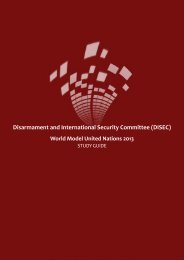Social, Humanitarian and Cultural Committee (SOCHUM)
Social, Humanitarian and Cultural Committee (SOCHUM)
Social, Humanitarian and Cultural Committee (SOCHUM)
Create successful ePaper yourself
Turn your PDF publications into a flip-book with our unique Google optimized e-Paper software.
Institute for Language Information <strong>and</strong> Technology<br />
at Eastern Michigan University. The most prominent<br />
NGO is the SIL, a nonprofit that publishes Ethnologue:<br />
Languages of the World, the encyclopedia from where<br />
much of the data in this background guide comes.<br />
The SIL is a faith-based organization whose goal is<br />
to document <strong>and</strong> revitalize endangered languages<br />
across the world. Founded in 1934, the SIL now has<br />
a staff of over five thous<strong>and</strong> <strong>and</strong> is currently studying<br />
almost three thous<strong>and</strong> different languages. 107<br />
the positions that your countries hold with regard<br />
to the protection of language endangerment are not<br />
easily divisible along regional lines. Governments will<br />
instead follow the official or unofficial linguistic policy<br />
that they hold for the languages within their borders.<br />
Many nations, including the united States <strong>and</strong><br />
much of Europe, have strict unilingual policies, only<br />
recognizing one official language; while these nations<br />
would not necessarily oppose language revitalization<br />
efforts, they would be unlikely to support a set of<br />
solutions that involve the recognition of endangered<br />
languages on a national level. Countries with multiple<br />
official languages, like much of Africa <strong>and</strong> Asia, would<br />
be more eager to propose solutions that involve the<br />
national recognition of endangered languages. Some<br />
countries have primary or secondary education in<br />
certain indigenous languages, whereas others only<br />
teach in the dominant language; while the former<br />
would be in favor of increased minority language<br />
education, the latter may not.<br />
Another factor that will determine your country’s<br />
position on the protection of endangered languages<br />
is the number <strong>and</strong> conditions of dying languages<br />
within its borders. A country like Australia, for<br />
example, which has a few languages that are critically<br />
endangered <strong>and</strong> has historically made no effort to<br />
protect those languages, would most likely be eager<br />
to institute programs to document fully <strong>and</strong> revitalize<br />
its dying languages, because it would be manageable<br />
given the number of languages remaining <strong>and</strong><br />
would show the government’s commitment to<br />
the indigenous population. A country like Nigeria,<br />
however, may be less inclined to support endangered<br />
languages initiatives because there are so many<br />
indigenous languages that it would have to protect.<br />
Furthermore, faced with a high level of poverty <strong>and</strong><br />
low levels of education, the Nigerian government<br />
may not want to spend its valuable resources on such<br />
programs.<br />
Finally, your nation’s policy must consider benefits<br />
that your country would experience from endangered<br />
language protection initiatives. A country that already<br />
has a strong tourism industry due to its dominant<br />
culture or natural resources, like the United States,<br />
would not gain much in terms of culture <strong>and</strong> tourism<br />
from protecting its indigenous languages; a nation<br />
with less tourism, like many Pacific Isl<strong>and</strong>s, may<br />
gain international recognition for its unique cultures<br />
<strong>and</strong> more foreign visitors if it chooses to protect<br />
its endangered languages. When developing your<br />
country’s policy on language endangerment, it is<br />
important to take all of these different factors into<br />
consideration. Just because your country has a strict<br />
unilingual policy, for example, does not necessarily<br />
mean that you should oppose all protections for<br />
endangered languages. A country with a thriving<br />
travel industry may support tourism as a method of<br />
endangered languages protection, even if it does<br />
not wish to see such measures instituted within<br />
its borders. The possible solutions for the problem<br />
of endangered languages are so broad that the<br />
question is not whether or not your country supports<br />
documentation <strong>and</strong> revitalization but which specific<br />
policies you think should be enacted.<br />
Suggestions for Further Research<br />
As a starting point, i would encourage you to do some<br />
research on the problem of language endangerment<br />
in general. UNESCO has a good overview of the<br />
29<br />
Melbourne Host Directorate PTY LTD | Office of Media <strong>and</strong> Design

















